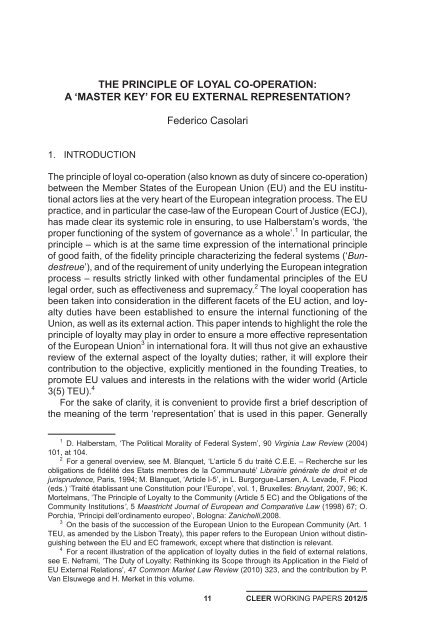Principles and practices of EU external representation - Asser Institute
Principles and practices of EU external representation - Asser Institute
Principles and practices of EU external representation - Asser Institute
Create successful ePaper yourself
Turn your PDF publications into a flip-book with our unique Google optimized e-Paper software.
The principle <strong>of</strong> loyal co-operation: A ‘master key’ for <strong>EU</strong> <strong>external</strong> <strong>representation</strong>?The principle <strong>of</strong> loyal co-operation:A ‘master key’ for <strong>EU</strong> <strong>external</strong> <strong>representation</strong>?Federico Casolari1. IntroductionThe principle <strong>of</strong> loyal co-operation (also known as duty <strong>of</strong> sincere co-operation)between the Member States <strong>of</strong> the European Union (<strong>EU</strong>) <strong>and</strong> the <strong>EU</strong> institutionalactors lies at the very heart <strong>of</strong> the European integration process. The <strong>EU</strong>practice, <strong>and</strong> in particular the case-law <strong>of</strong> the European Court <strong>of</strong> Justice (ECJ),has made clear its systemic role in ensuring, to use Halberstam’s words, ‘theproper functioning <strong>of</strong> the system <strong>of</strong> governance as a whole’. 1 In particular, theprinciple – which is at the same time expression <strong>of</strong> the international principle<strong>of</strong> good faith, <strong>of</strong> the fidelity principle characterizing the federal systems (‘Bundestreue’),<strong>and</strong> <strong>of</strong> the requirement <strong>of</strong> unity underlying the European integrationprocess – results strictly linked with other fundamental principles <strong>of</strong> the <strong>EU</strong>legal order, such as effectiveness <strong>and</strong> supremacy. 2 The loyal cooperation hasbeen taken into consideration in the different facets <strong>of</strong> the <strong>EU</strong> action, <strong>and</strong> loyaltyduties have been established to ensure the internal functioning <strong>of</strong> theUnion, as well as its <strong>external</strong> action. This paper intends to highlight the role theprinciple <strong>of</strong> loyalty may play in order to ensure a more effective <strong>representation</strong><strong>of</strong> the European Union 3 in international fora. It will thus not give an exhaustivereview <strong>of</strong> the <strong>external</strong> aspect <strong>of</strong> the loyalty duties; rather, it will explore theircontribution to the objective, explicitly mentioned in the founding Treaties, topromote <strong>EU</strong> values <strong>and</strong> interests in the relations with the wider world (Article3(5) T<strong>EU</strong>). 4For the sake <strong>of</strong> clarity, it is convenient to provide first a brief description <strong>of</strong>the meaning <strong>of</strong> the term ‘<strong>representation</strong>’ that is used in this paper. Generally1 D. Halberstam, ‘The Political Morality <strong>of</strong> Federal System’, 90 Virginia Law Review (2004)101, at 104.2 For a general overview, see M. Blanquet, ‘L’article 5 du traité C.E.E. – Recherche sur lesobligations de fidélité des Etats membres de la Communauté’ Librairie générale de droit et dejurisprudence, Paris, 1994; M. Blanquet, ‘Article I-5’, in L. Burgorgue-Larsen, A. Levade, F. Picod(eds.) ‘Traité établissant une Constitution pour l’Europe’, vol. 1, Bruxelles: Bruylant, 2007, 96; K.Mortelmans, ‘The Principle <strong>of</strong> Loyalty to the Community (Article 5 EC) <strong>and</strong> the Obligations <strong>of</strong> theCommunity Institutions’, 5 Maastricht Journal <strong>of</strong> European <strong>and</strong> Comparative Law (1998) 67; O.Porchia, ‘Principi dell’ordinamento europeo’, Bologna: Zanichelli,2008.3 On the basis <strong>of</strong> the succession <strong>of</strong> the European Union to the European Community (Art. 1T<strong>EU</strong>, as amended by the Lisbon Treaty), this paper refers to the European Union without distinguishingbetween the <strong>EU</strong> <strong>and</strong> EC framework, except where that distinction is relevant.4 For a recent illustration <strong>of</strong> the application <strong>of</strong> loyalty duties in the field <strong>of</strong> <strong>external</strong> relations,see E. Neframi, ‘The Duty <strong>of</strong> Loyalty: Rethinking its Scope through its Application in the Field <strong>of</strong><strong>EU</strong> External Relations’, 47 Common Market Law Review (2010) 323, <strong>and</strong> the contribution by P.Van Elsuwege <strong>and</strong> H. Merket in this volume.11CLEER WORKING PAPERS 2012/5








